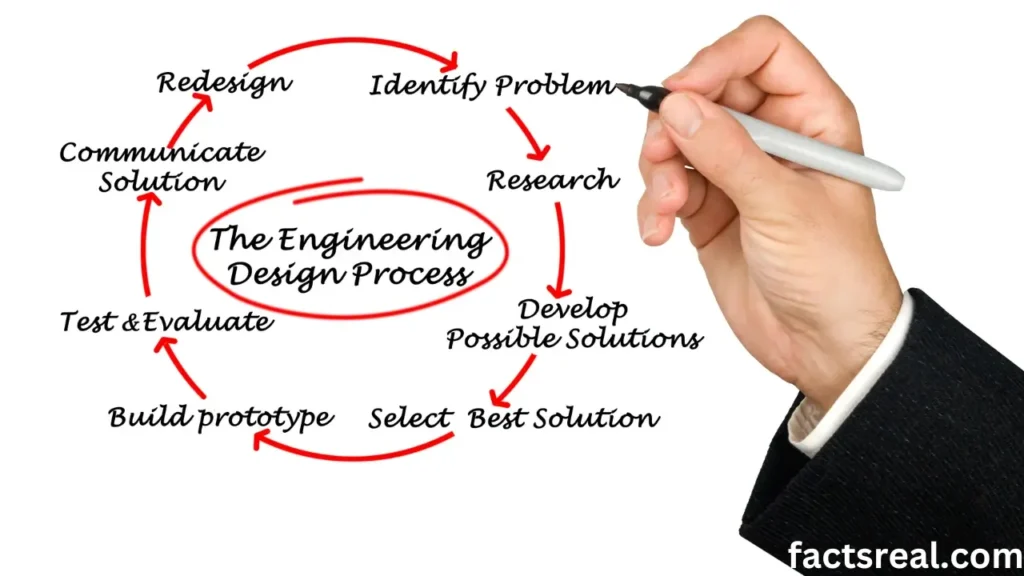Discover interesting facts about engineering, the innovative field that drives progress and transforms the world.
Engineering is the application of science, mathematical form, and technology to resolve problems and make solutions that improve daily life easy. It involves structuring, creating, building, making, and maintaining structures, systems, and machines.
- Brief History of Engineering
- Role Of Engineers In Society
- Civil Engineering
- Electrical Engineering
- Chemical Engineering
- Software Engineering
- Transportation Advancements
- Medical Breakthroughs
- Communication Revolution
- Environmental Engineering and Sustainability Efforts
- Major Engineering Projects
- Advances In Renewable Energy Technologies
- Climate Change and Environmental Sustainability
- Urbanization And Infrastructure Needs
- Adoption of Renewable Energy Sources And Energy Efficiency
- Emerging Fields
- Key inventions
Brief History of Engineering
Engineering is related to ancient civilizations, where it was used to construct the pyramids in Egypt and Rome. Every century, it’s ready with the Industrial Revolution in the 18th century that sparked rapid advancements in machinery, transmission, and infrastructure.
Role Of Engineers In Society
Engineers play an important role in shaping modern and influential society. They design bridges, roads, and buildings, make sustainable energy systems, and create inventions like smartphones, and medical and electrical devices. Engineers ensure believable safety, efficiency, and sustainability that uses nearly every modern life which is from transportation to healthcare, to resolve electrical problems. Their work directly impacts economic and financial growth and the quality of life.
Key Disciplines of Engineering

Civil Engineering
Civil engineering may be a department of design centered on designing and building a framework that underpins existence. It includes arranging and building roads, bridges, buildings, and other basic structures. Respectful engineers guarantee that the foundation is secure, effective, and solid. Bridges, for illustration, are outlined to bolster overwhelming loads while withstanding common strengths like wind and water. Streets interface cities and towns, progressing transportation and boosting economies.
Electrical Engineering
Electrical engineering focuses on planning, analyzing, and keeping up with electrical systems. In power systems, engineers oversee the era and dissemination of power, guaranteeing productive and dependable vitality for homes and businesses. Hardware bargains with smaller circuits like microchips empower gadgets like smartphones and computers to function.
Telecommunications includes transmitting data over long separations utilizing signals, such as in cell systems and the web. These areas depend on development, making them pivotal to cutting-edge innovation.
From keeping the lights on to empowering worldwide communication, electrical engineers offer assistance, control, and interface with the world in endless ways.
Chemical Engineering
Chemical engineering is all about changing crude materials into valuable items through chemical forms. It includes planning and optimizing frameworks that alter substances, like turning oil into fuel or making plastics from chemicals.
Chemical engineers work with reactors, refining columns, and filtration frameworks to guarantee secure and productive generation.
They center on adjusting responses, controlling temperatures, and overseeing weights to urge the required yield. Their work is imperative in businesses like pharmaceuticals, vitality, and nourishment generation.
By combining chemistry, material science, and engineering, chemical engineers make materials and items that move forward in existence.
Software Engineering
The design and development of software systems to address practical issues is known as software engineering. It is indeed an art, combining creativity and technical skills that can generate mobile applications or extremely complex enterprise systems.
Engineers break the project into stages like planning, coding, testing, and maintenance so that the final product performs well and achieves the needs of the user.
They use programming languages, frameworks, and tools to build up these systems. System design is a very important area of software engineering where engineers will have a plan for how the different parts of it will work so that the end functionality is achieved. In such a field, detailed analysis for collaboration and problem-solving is crucial.
Impact Of Engineering On Society

Transportation Advancements
Engineering has taken transportation to a whole new level by providing mobility and greater connectivity. What were once luxury commodities, like automobiles, are now integrated with elements of high technologies that enhance safety and efficiency.
Planes greatly reduced the time for global travel because of inventions like jet engines and streamlined aerodynamics that permitted flights at higher velocities for longer distances.
The railway industry is also different today; high-speed trains can travel at speeds over 300 km per hour. For this reason, the innovations made in engineering have led to the emergence of sustainable transport solutions, including hydrogen fuel cells and magnetic levitation trains, thereby opening up a greener future in transport.
Medical Breakthroughs
Engineering has changed transportation so that all humankind can take the step of being on the move and connect what otherwise could not be reached or accessed. Cars were once considered a luxury and are now fitted with more advanced technologies like GPS and electric powertrains, ensuring safety and efficiency.
Planes shorten the time between places around the globe; jet engines and shapes allow for faster flight across longer distances. Railways have transformed into high-speed trains, reaching speeds above 300 km/h, and travel times have been reduced by considerable extents.
Further, the concepts of sustainable transportation have also been developed through the help of some of the engineering innovations that include hydrogen fuel cells, magnetic levitation trains, and a good many more, all for a brighter green future in transport.
Communication Revolution
Engineering plays a very crucial role in the communication revolution. It has enabled the development of the internet, smartphones, and satellites, giving a new form to the way we communicate.
The internet, propagated by network engineering, offers instant access to information at any point in the world. Smartphones, as products of electrical and software engineering, make computing power and connectivity available for all purposes, anywhere, anytime. Simultaneously, satellite engineering makes a global system of communication networks possible, such as GPS and satellite TV.
These innovations, then, strengthened not only personal means of communication but also changed the face of many industries, education, and entertainment. The impact of engineering on our interconnected world is profound.
Environmental Engineering and Sustainability Efforts
Essentially, environmental engineers provide designs of clean water systems, air quality control systems, and waste management as sustainable waste management products. Furthermore, they evaluate environmental impact and enforce green practice, which comprises renewable energy solutions and the use of eco-friendly materials.
Through its promotion of sustainable development, environmental engineering faces the challenges of climate change to ensure a healthier and more sustainable world for successive generations.
Engineering Milestones

Major Engineering Projects
Engineering marvels reflect human resourcefulness and aspirations. The Panama Canal, constructed in 1914, changed sea exchange by linking the Atlantic and Pacific Seas, this effectively reduced travel time for vessels.
The Burj Khalifa in Dubai towers at 828 meters, marking the world’s tallest building – a scenario of headways in materials and design. The Expansive Hadron Collider, found close to Geneva, is the biggest and most capable molecule-quickening agent, empowering researchers to investigate principal questions around the universe.
Each of these ventures represents how designing shapes our world, pushes mechanical boundaries, and improves our understanding of nature and society.
Advances In Renewable Energy Technologies
This is when engineering begins to front major technological breakthroughs in renewable energy applications and changes the way we harness natural resources. Innovations that come along with solar panels, wind turbines, and energy storage systems bring renewable energy closer and better.
For instance, the efficiency of solar panels has rocketed much higher to enable us to reap even more energy from the same rays of the sun. The turbines designed for lower wind conditions extend their application period.
Engineers are also working on new battery technologies to store renewable energy so that it is deployed whenever the sun is not shining or the wind is not blowing to support a cleaner, sustainable future.
Modern Engineering Challenges

Climate Change and Environmental Sustainability
Developing such engineering areas as sustainable transport leads to reduced emissions of greenhouses through electric vehicles and efficient public transportation. Engineers stress the importance of waste management techniques that will improve recyclable processes and produce biodegradable materials.
Furthermore, they also fit smart technologies into buildings to increase energy efficiency and saving of resources. In this way, engineering contributes to the reduction of climate change by building a better future for generations.
Urbanization And Infrastructure Needs
Engineering has served as a backbone for urbanization and the infrastructure of any place. As cities are expanding and urban regions are getting bigger, engineers design sustainable transport systems, including fast-transit systems and intelligent roads. They also come up with inventions to house people, ensuring clean water and electricity supply to all the residents.
There are structural engineers, who design robust structures that are capable of withstanding natural disasters; then there are civil engineers, who manage the bridge, tunnel, and highway constructions that would unite communities in a given area.
In addition, environmental engineers focus on waste reduction and green spaces, improving the quality of life in urban areas. Together we contribute to the eventual making of our cities.
Adoption of Renewable Energy Sources And Energy Efficiency
Some of the most innovative solutions developed in engineering include smart grids and energy-efficient buildings that cut down on all forms of energy consumption and waste. Engineers design solar panels and wind turbines to tap into natural sources of clean energy.
The technology they will develop for storing energy will be something like advanced batteries to deliver power when needed. Besides, engineering practices have optimized energy utilization in industrial processes with a great reduction in emissions.
With sustainability as the fabric of engineering, we will provide a greener future and can show that careful design and technology could well be there to combat climate change and give very good conservation of resources.
Future of Engineering And Interesting Facts About Engineering
Emerging Fields
Biotechnology involves biology and technology for advancements in medical innovations such as gene editing and personalized medicine and improvements in health care and agriculture. Nanotechnology, involving the alteration of matter at atomic dimensions, has led to discoveries in materials, electronics, and energy solutions, such as strengthened materials and densified solar panels.
Robotics and engineering combined with AI make man-manufactured machines that perform very complex operations, from manufacturing on the shop floor to surgical interventions; hence, productivity and safety are enhanced.
Those areas not only revolutionize different industries but also solve global problems, so to a certain extent, engineering could be said to be an exciting career choice since it makes one change the world for the better.
Key inventions
Modern engineering has transformed this world through a few significant inventions. There was the steam engine in the 18th century revolutionized transportation and manufacturing by working on the power of steam. It ended up developing the Industrial Revolution.
The electric motor in the 19th century converted electrical energy into mechanical forms of energy, with which many different devices fans to factory machinery can now operate efficiently. The microchip is one of the inventions that took place during the 20th century, and it miniaturized electronic circuits into what we call the digital age.
That tiny little power component means everything between smartphones and computers is possible today, bringing technology closer and more compact.
Conclusion
Engineering is an expansive and critical field that energizes innovation, building the world into what it will become tomorrow. Whether designing bridges or developing high technologies, engineers play a really important role in solving today’s problems for everyone across the globe.
Creativity is combined with technical know-how to further strengthen infrastructure, improve sustainability, and guarantee safety. Civil, mechanical, electrical, and software engineering are included in this vast scope.
We are going to be at the forefront of finding solutions to such problems as climate change, resource scarcity, and many others that decide our tomorrow. And on that basis, engineering is not just a profession but a way to progress with positive changes.
How many branches are there of engineering?
Many branches of engineering like civil, mechanical, electrical, chemical, aerospace, and computer engineering, etc. There are various branches of engineering interacting with different domains of technology and innovation.
Some important skills engineers must include?
This should comprise a good set of problem-solving, analytical reasoning abilities, creativity, teamwork, and substantial communication skills. Technical skills which are vital to the particular discipline cannot be ignored.
Why is engineering important?
Important for societal development because it incurs innovation, improvement of standard living, sustainability solutions, and significant input into infrastructure, health care delivery, and technology.
